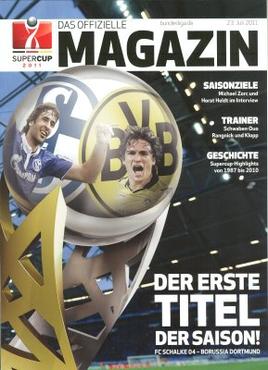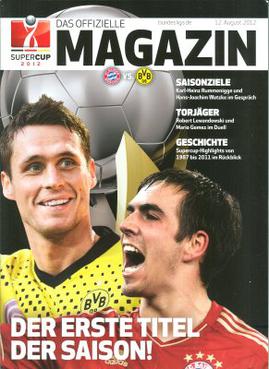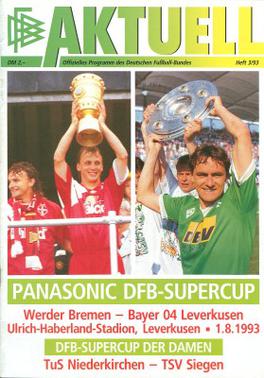
The 1989 DFB-Supercup was the third DFB-Supercup, an annual football match contested by the winners of the previous season's Bundesliga and DFB-Pokal competitions.

The 2011 DFL-Supercup was the second DFL-Supercup, an annual football match contested by the winners of the previous season's Bundesliga and DFB-Pokal competitions. It was a Revierderby between 2010–11 Bundesliga winners Borussia Dortmund, and 2010–11 DFB-Pokal winners Schalke 04. The match was played at Gelsenkirchen on 23 July 2011.

The 1995 DFB-Supercup, known as the Panasonic DFB-Supercup for sponsorship purposes, was the ninth DFB-Supercup, an annual football match contested by the winners of the previous season's Bundesliga and DFB-Pokal competitions.

The 2012 DFL-Supercup was the third DFL-Supercup, an annual football match contested by the winners of the previous season's Bundesliga and DFB-Pokal competitions. It took place on 12 August 2012 at the Allianz Arena. The match featured Borussia Dortmund, winners of both the 2011–12 Bundesliga and 2011–12 DFB-Pokal, and Bayern Munich, runners-up in both the Bundesliga and DFB-Pokal.
During the 1996–97 German football season, Borussia Dortmund competed in the German Bundesliga.

The 2013 DFL-Supercup was the fourth DFL-Supercup, an annual football match contested by the winners of the previous season's Bundesliga and DFB-Pokal competitions. It featured Bayern Munich, winners of the 2012–13 Bundesliga and the 2012–13 DFB-Pokal, and, as a result of the former winning both competitions, the Bundesliga runners-up Borussia Dortmund. The match was hosted by Dortmund at the Signal Iduna Park on 27 July 2013. The match took place two months after the same teams played each other in the 2013 UEFA Champions League Final.

The 2014 DFL-Supercup was the fifth edition of the German Super Cup under the name DFL-Supercup, an annual football match contested by the winners of the previous season's Bundesliga and DFB-Pokal competitions. It featured Bayern Munich, winners of the 2013–14 Bundesliga, and Borussia Dortmund, the runners-up of the 2013–14 Bundesliga who also reached the 2014 DFB-Pokal final.
The 2016–17 DFB-Pokal was the 74th season of the annual German football cup competition. Sixty-four teams participated in the competition, including all teams from the previous year's Bundesliga and the 2. Bundesliga. It began on 19 August 2016 with the first of six rounds and ended on 27 May 2017 with the final at the Olympiastadion in Berlin, a nominally neutral venue, which has hosted the final since 1985. The DFB-Pokal is considered the second-most important club title in German football after the Bundesliga championship. The DFB-Pokal is run by the German Football Association (DFB).

The 2016 DFL-Supercup was the seventh edition of the German Super Cup under the name DFL-Supercup, an annual football match contested by the winners of the previous season's Bundesliga and DFB-Pokal competitions. The match was played on 14 August 2016 at the Signal Iduna Park in Dortmund.

The 1977 German Supercup was an unofficial edition of the German Supercup, a football match contested by the winners of the previous season's Bundesliga and DFB-Pokal competitions.
The 2008 German Supercup, known as the T-Home Supercup for sponsorship reasons, was an unofficial edition of the German Supercup, a football match contested by the winners of the previous season's Bundesliga and DFB-Pokal competitions.

The 1992 DFB-Supercup, known as the Panasonic DFB-Supercup for sponsorship purposes, was the 6th DFB-Supercup, an annual football match contested by the winners of the previous season's Bundesliga and DFB-Pokal competitions.

The 1993 DFB-Supercup, known as the Panasonic DFB-Supercup for sponsorship purposes, was the 7th DFB-Supercup, an annual football match contested by the winners of the previous season's Bundesliga and DFB-Pokal competitions.

The 2017 DFL-Supercup was the eighth edition of the German super cup under the name DFL-Supercup, an annual football match contested by the winners of the previous season's Bundesliga and DFB-Pokal competitions. The match was played on 5 August 2017.
The 2018–19 DFB-Pokal was the 76th season of the annual German football cup competition. Sixty-four teams participated in the competition, including all teams from the previous year's Bundesliga and the 2. Bundesliga. The competition began on 17 August 2018 with the first of six rounds and ended on 25 May 2019 with the final at the Olympiastadion in Berlin, a nominally neutral venue, which has hosted the final since 1985. The DFB-Pokal is considered the second-most important club title in German football after the Bundesliga championship. The DFB-Pokal is run by the German Football Association (DFB).

The 2019 DFL-Supercup was the tenth edition of the German super cup under the name DFL-Supercup, an annual football match contested by the winners of the previous season's Bundesliga and DFB-Pokal competitions. The match was played on 3 August 2019.
The 2019–20 DFB-Pokal was the 77th season of the annual German football cup competition. Sixty-four teams participated in the competition, including all teams from the previous year's Bundesliga and 2. Bundesliga. The competition began on 9 August 2019 with the first of six rounds and ended on 4 July 2020 with the final at the Olympiastadion in Berlin, a nominally neutral venue, which has hosted the final since 1985. The DFB-Pokal is considered the second-most important club title in German football after the Bundesliga championship. The DFB-Pokal is run by the German Football Association (DFB).

The 2020 DFL-Supercup was the eleventh edition of the German super cup under the name DFL-Supercup, an annual football match contested by the winners of the previous season's Bundesliga and DFB-Pokal competitions. The match was played on 30 September 2020. The match is usually played in July or August prior to the start of the Bundesliga. However, due to postponement of the 2019–20 Bundesliga as a result of the COVID-19 pandemic, the start of the 2020–21 season was delayed until September 2020. Due to the COVID-19 pandemic, the match was played behind closed doors.
The 2021–22 DFB-Pokal was the 79th season of the annual German football cup competition. Sixty-four teams participated in the competition, including all teams from the previous year's Bundesliga and 2. Bundesliga. The competition began on 6 August 2021 with the first of six rounds and ended on 21 May 2022 with the final at the Olympiastadion in Berlin, a nominally neutral venue, which has hosted the final since 1985. The DFB-Pokal is considered the second-most important club title in German football after the Bundesliga championship. The DFB-Pokal is run by the German Football Association (DFB).
The 2022–23 DFB-Pokal was the 80th season of the annual German football cup competition. Sixty-four teams participated in the competition, including all teams from the previous year's Bundesliga and 2. Bundesliga. The competition began on 29 July 2022 with the first of six rounds and ended on 3 June 2023 with the final at the Olympiastadion in Berlin, a nominally neutral venue, which has hosted the final since 1985. The DFB-Pokal is considered the second-most important club title in German football after the Bundesliga championship. The DFB-Pokal is run by the German Football Association (DFB).














